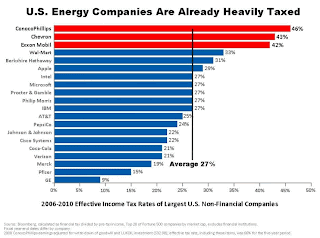A 1952 investigation by the U.S. Federal Trade Commission found that the "Seven Sisters" (Exxon, Mobil, Chevron, Gulf, Texaco, Shell, and BP) held nearly two-thirds of the free world's oil reserves and operated 55 percent of world oil production and refining capacity. In 2010, the Seven Sisters -- now merged into four companies (ExxonMobil, Chevron, Shell, and BP) -- held about 2.5 percent of world oil reserves, primarily under contract with governments, and accounted for only 10 percent of world oil production and 15 percent of global refining. State-owned national oil companies (NOCs) have displaced Big Oil as the major reserve holders and oil producers. The NOCs of Saudi Arabia, Iran, Kuwait, Abu Dhabi, Iraq, and Venezuela control 60 percent of world oil reserves, and most of this oil is off-limits to private investors.
If Big Oil's omnipresence is overstated, so is its impact on the cost of oil; consumers' ire over high gas prices would be better aimed at governments than oil companies. The majors are certainly profitable businesses -- the 2010 earnings of today's Four Sisters (excluding BP's oil spill costs) totaled just over $100 billion. But that amounts to just 2 percent of the $4 trillion in petroleum products sold worldwide in 2010 -- the rest went to operating costs and government taxes. And that money didn't just go to OPEC and other producing countries -- oil-consuming countries alone extracted about $700 billion in excise and sales taxes from consumers, nearly seven times the take of all the oil majors combined.
Notes Toward a Better Understanding of Six Intersecting Pieces of the Energy Puzzle: Climate Change, Peak Resources, Nuclear Proliferation, Food Security, Speculative Finance, and Geopolitics
May 13, 2011
Big Oil's Taxes and Reserves
If this chart (from the Financial Times) fairly represents the record, it is pretty darn impressive. The major oil companies are much diminished from their former days of dominance; their profits, though huge in absolute terms, are tiny in relation to the total amount produced and consumed. Notes Bruce Everett, writing in Foreign Policy:

No comments:
Post a Comment